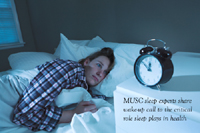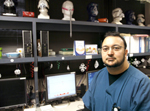|
By
Dawn Brazell
Public Relations
The world
would be a much better place if
people would get more sleep.
That's
what Fitzgerald
Drummond, M.D., and staff
at MUSC's Sleep Disorders Center
believe. Drummond would like
physicians to take sleep
disorders more seriously,
assessing patients on the
quality of their sleep just as
they gather information on other
health markers, such as weight
and blood pressure.
 Recent
studies indicate that nearly one
in three adults in the U.S.
reported getting less than seven
hours of sleep per night, and
about 50 to 70 million Americans
suffer from chronic sleep
disorders. Sleep specialists are
finding chronic sleep loss to be
associated with a wide range of
health issues, including
obesity, diabetes, high blood
pressure, stroke, cardiovascular
disease, depression and other
psychological disorders. Recent
studies indicate that nearly one
in three adults in the U.S.
reported getting less than seven
hours of sleep per night, and
about 50 to 70 million Americans
suffer from chronic sleep
disorders. Sleep specialists are
finding chronic sleep loss to be
associated with a wide range of
health issues, including
obesity, diabetes, high blood
pressure, stroke, cardiovascular
disease, depression and other
psychological disorders.
What Joe
Secondary, sleep technologist at
MUSC, finds is that most people
aren't aware of the huge impact
the quality of their sleep has
on the quality of their waking
hours.
 Sleep technologist
Joe Secondary enjoys educating
patients about sleep. Sleep technologist
Joe Secondary enjoys educating
patients about sleep.
For information on the Sleep
Disorders Center, visit
http://www.muschealth.com/sleeplab/
or watch a video at
http://tinyurl.com/74aj5xv.
"Sleep is
a necessity, not a luxury. It's
just as important as nutrition.
It's just as important to sleep
better as it is to eat better.
One of the things that we're
sacrificing big time in our
busy, busy lifestyles is our
nutrition – our obesity rates
are higher. We're sacrificing
our nutrition, and we're
sacrificing our sleep as well.
We're shaving time here and
we're shaving time there. Now
we're getting less sleep, and
we're seeing more sleep
disorders."
A common
sleep disorder, obstructive
sleep apnea (OSA), affects more
than 18 million Americans. MUSC
soon will be offering portable
sleep testing studies to
evaluate adult patients for this
condition, which is
characterized by repeated
episodes of upper airway
collapse during sleep.
Secondary
said the studies will allow
testing to be done in the
comfort of people's homes,
providing more screening and
evaluation options and almost
doubling the testing to be done
in the comfort of people's
homes, providing more screening
and evaluation options and
almost doubling the number of
patients who can be treated.
The MUSC
sleep center has purchased two
portable units and will be
initiating inpatient tests
within the next few months to
evaluate the procedure for home
use. Ultimately these portable
tests will reduce costs to
insurance companies and
patients.
"It's an
advantage of the patient to be
in their home as opposed to
being in a strange environment.
There's less equipment to wear.
These studies are for
obstructive sleep apnea patients
specifically, which is the
majority of our patients. It
looks at respiration, oxygen
levels, pulse and EKG. It's four
channels as opposed to 18."
The field
of sleep study compared to other
medical specialties still is in
its infancy. The first
continuous positive airway
pressure or CPAP devices began
being used in the 1980s, he
said. Now specialty areas are
developing including research
into pediatric sleep disorders
and into the rising number of
people who suffer from insomnia.
Andrei B.
Vedeniapin, M.D., assistant
professor in the Department of
Psychiatry and Behavioral
Sciences and one of MUSC's
insomnia experts, said there is
no magic pill so far to cure
chronic insomnia. Chronic
insomnia is more complicated
than a case of sleep deprivation
or poor sleep related to a
condition such as sleep apnea.
It's a separate medical
diagnosis, he said.
Chronic
insomnia may lead to daytime
sleepiness and fatigue and
contribute to developing
anxiety, depression or substance
abuse. The patient is advised on
good sleep hygiene rules, but
sometimes following these rules
still is not enough to give
patients suffering from chronic
insomnia a good night's sleep
where they awaken feeling
rested.
"Then,
sleep medicine together with
psychology and psychiatry may
provide important help to
patients with chronic insomnia."
MUSC has a
Sleep Research Data Repository
Project that is collecting
comprehensive sleep-related
information on people with sleep
disorders, with one
focus area being insomnia.
This repository will provide
information for future research
projects in this
area. There also are weekly
sleep research meetings at the
Department of Psychiatry and
Behavioral Sciences that are
dedicated to discussions about
new sleep-related research being
conducted within the department
and worldwide. The meetings are
for all professionals interested
in sleep research and sleep
medicine, he said.
A problem
for many people, whether they
have chronic insomnia or not, is
sleep deprivation. The National
Sleep Foundation recommends that
adults receive between seven to
nine hours per night; school
children age 5 to 12, 10 to 11
hours; and adolescents, 11 to 17
years old, eight and a half to
nine and a half hours.
Secondary said the more
consolidated REM or rapid-eye
movement sleep happens during
the second half of the night,
more in the early morning hours.
Electronic stimulation and busy
lifestyles make it harder to get
to bed earlier, so that REM
sleep often gets sacrificed.
Other
important factors are
medications that can interrupt
sleep and substances such as
alcohol and caffeine. "In REM
your brain is very active.
That's where the brain is
preparing for the new challenges
of the day. Alcohol as a
sedative makes you sleepy, but
it can lead to a more fragmented
and less restorative sleep. It
also can increase apnea
problems."
Secondary
likes to educate the public on
healthy sleep habits and the
latest treatments, medications
and devices – such as customized
CPAP machines including a
smaller one for women that's now
available. One of the new
treatments is a clinical trial
studying the effectiveness of a
new therapy for patients with
moderate to severe obstructive
sleep apnea. MUSC is
participating in the STAR
clinical trial that uses an
implantable therapy that works
with the body's natural
physiology to prevent airway
obstruction.
Secondary
said it's important that more
research is being done about
sleep disorders, especially
given the rise of sleep
disorders in children. In some
cases, children are being
medicated for such conditions as
ADHD when their symptoms could
be solved by addressing their
sleep deprivation. It's
important that parents realize
that children need more sleep
than they may think. Some states
have pushed back school start
times in recognition that
students need later start times,
he said.
"I wish
people knew how important sleep
is to their long-term health.
You sacrifice sleep, and you
sacrifice years off the end of
your life. If you sleep better,
you're going to live better.
You're going to have more energy
during the day, and you're going
to feel more rested, and you'll
function better. It's a general
building block of your life."
Tips for Sweet Dreams
Here
are sleep technologist Joe
Secondary's suggestions for a
great night's rest.
- Train
the brain that the bed's for
sleep. It's a psychological
factor. You want the brain to
know it's not your office or
play area. It's not your
Facebook time. You want to
train your body so that your
sleep hormones initiate
properly.
- Create
a dark environment.
Turn off the TV and other
electronic equipment. The
bursts of light from
electronic sources can disrupt
people's circadian rhythm.
- Limit
nicotine, caffeine and alcohol
before bed. Alcohol and
caffeine can affect the
quality of sleep. You can have
increased arousals and
fragmentation, and it
decreases rapid eye movement
sleep.
- Set up
a sleep schedule.
Make sleep intentional and
adjust your schedule to allow
the mind to wind down. Try to
settle issues before going to
bed and have a relaxing
routine before bed. Any
relaxation technique –
breathing exercises or yoga –
can help. "A lot of people
find their minds are racing –
there's too much going, too
much thinking – and they can't
wind down."
- Avoid
exercise too close to bedtime.
- Try
keeping a sleep diary. You can
download one at
http://yoursleep.aasmnet.org/pdf/sleepdiary.pdf.
Pay attention to your fatigue
levels during the day. "People
have gotten so used to it that
they don't realize they are
fatigued. Track what's going
on."
|



 Recent
studies indicate that nearly one
in three adults in the U.S.
reported getting less than seven
hours of sleep per night, and
about 50 to 70 million Americans
suffer from chronic sleep
disorders. Sleep specialists are
finding chronic sleep loss to be
associated with a wide range of
health issues, including
obesity, diabetes, high blood
pressure, stroke, cardiovascular
disease, depression and other
psychological disorders.
Recent
studies indicate that nearly one
in three adults in the U.S.
reported getting less than seven
hours of sleep per night, and
about 50 to 70 million Americans
suffer from chronic sleep
disorders. Sleep specialists are
finding chronic sleep loss to be
associated with a wide range of
health issues, including
obesity, diabetes, high blood
pressure, stroke, cardiovascular
disease, depression and other
psychological disorders. Sleep technologist
Joe Secondary enjoys educating
patients about sleep.
Sleep technologist
Joe Secondary enjoys educating
patients about sleep.